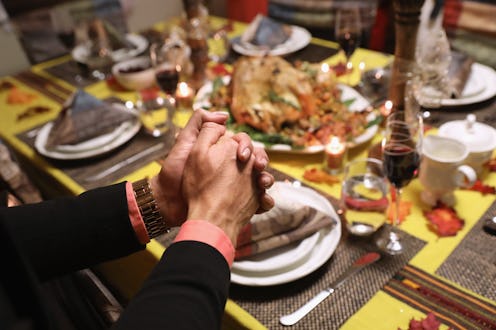
The fourth Thursday in November is usually viewed as a day to spend time with family, express gratitude, and watch sporting events, but Thanksgiving's history is pretty complicated. If you're anything like me, you were probably taught that Thanksgiving was a peaceful holiday where Native Americans and pilgrims from Europe hung out and had a delicious meal. It wasn't until college that I learned Thanksgiving actually has a pretty messed up history. Natives died in large numbers because the settlers brought both disease and violence, and the first Thanksgiving actually marked the start of a Native American massacre. So what do you do if you still want to take part in the holiday? For many of us, Thanksgiving is a family tradition and obligation, and you may be wondering how to observe the holiday while acknowledging its messed up history.
The misinformation surrounding Thanksgiving's history is so pervasive that the National Museum of the American Indian provides classroom lessons for teachers who want to give students an honest holiday perspective. If anyone you know chooses not to observe the holiday because of its history, don't guilt them or ask needless questions. Thanksgiving is a painful day for many indigenous people, and it's important to validate the frustration the holiday brings for people whose ancestors were wiped out by European settlers. If you do participate next week, consider being mindful of how hurtful the day is for some Americans — and encourage your family members to be mindful as well.
Have Those Uncomfortable Dinner Table Discussions
The mistreatment of Native Americans at the hand of the U.S. isn't a long-ago, one-time mistake. Consider how Trump approved the Dakota Access Pipeline this past February even though the Standing Rock Sioux tribe had protested it for months as just one example. When you're observing Thanksgiving, it's important to call out any problematic language you may hear at the dinner table, especially if it relates to indigenous people. If your family members talk about their support for Trump, take it as an opportunity to remind them of how damaging his presidency has been for marginalized people everywhere, but especially Native Americans. This doesn't have to be a painful confrontation, either; preparing a few talking points in advance will help you have a measured conversation with your family members about how this day can be damaging for many people.
Acknowledge The National Day of Mourning
The National Day Of Mourning is a day to acknowledge the lives lost due to European settlers. It began in 1970, and its held every Thanksgiving at historic Cole’s Hill in Plymouth, Massachusetts. Event participants "honor Native ancestors and the struggles of Native peoples to survive today," according to the official website. Even if you can't attend the event at Plymouth, the United American Indians of New England is looking for volunteers who can help set up and prepare food in the days leading up to the Day of Mourning.
Donate To Indigenous-Rights Organizations
Indigenous people face higher rates of mental illness, sexual assault, and mortality than other Americans. This Thanksgiving, consider donating to a nonprofit organization that helps people who are negatively affected by systemic oppression and colonialism in the first place. Diversity Best Practices has a list of nearly two dozen Native-focused organizations, but you can also donate to a local nonprofit.
Support Native-Owned Businesses And Artists
Another way to acknowledge the harm done by the occasion observed on Thanksgiving, is by making an effort to support Native-owned businesses and artists as you buy gifts for your loved ones. The American Indian Business Alliance has a directory with Native-owned businesses across the U.S., and there are many online stores dedicated to work produced by Native artists.
Talk About What Actually Happened On Thanksgiving
I mentioned that I didn't realize until college that the Thanksgiving story I was taught as a child was a myth. I understand why people may be uncomfortable discussing death and violence around children, but we have to acknowledge our nation's problematic history. Make time to discuss the history of Thanksgiving as you observe the holiday. You could have people in your family or friend circle who still don't know about Thanksgiving's troubled history.
Do Not Use Culturally Appropriative Decorations
Pinterest is filled with creative ways to decorate your home for Thanksgiving, and the majority of them are not problematic. It's important to avoid any crafts or decorations that feed into the Pilgrim myth, and it's also a good idea to avoid anything that may inadvertently mock Native culture, like headdresses or face paint. Cultural appropriation is always harmful, but it's even more of an insult on Thanksgiving.
Take Time To Reflect On The Lives Lost
If your Thanksgiving holiday involves sharing what you're thankful for, or reflecting on those who couldn't be with you, spend some time acknowledging the people who suffered thanks to European settlement that the Thanksgiving myth venerates. It's possible to observe the holiday in a spirit of gratefulness, but don't ignore the very real pain of the indigenous people who were here before any other Americans. Whether it's a prayer or a moment of silence, add a moment of reflection to your holiday to remember the lives lost because of colonization.